Sick Chicken Symptoms
Having a chicken that is not feeling well can be worrisome to a chicken owner. In this article, we’ll cover a few of the most common sick chicken symptoms, from injuries and illnesses to worms and parasites.
Raising chickens begins with their health, and that is what we will talk about today. How to raise healthy and happy chickens.
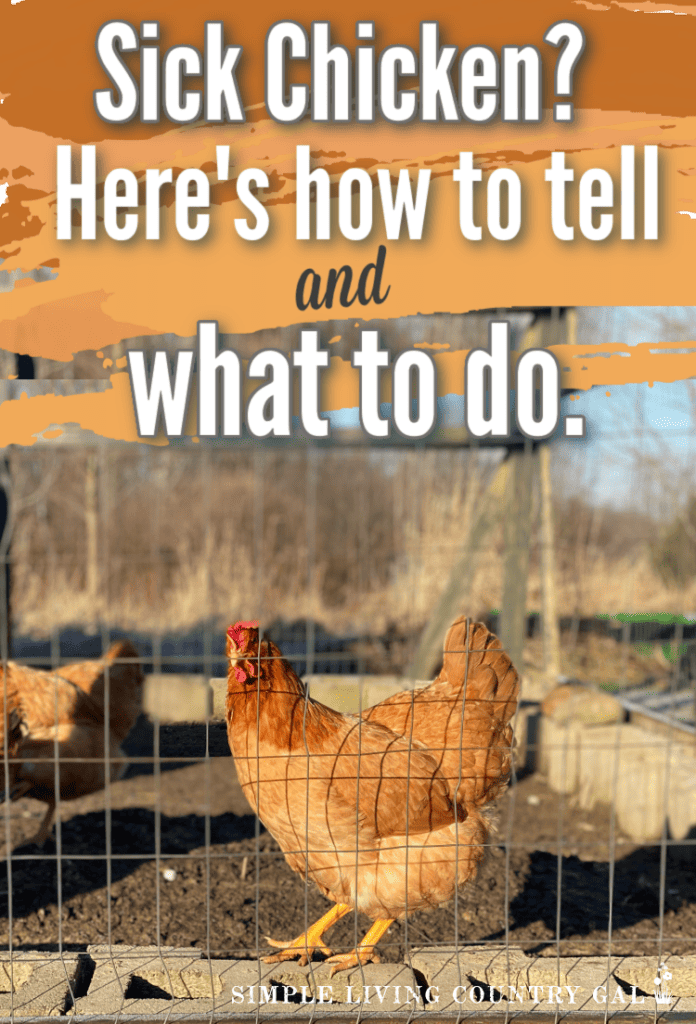
If you’re a chicken owner, then chances are that at some point or another, you will be faced with a sick or injured chicken. Knowing what to look out for and how to care for them can go a long way to helping you to feel more confident raising a healthy flock. I am going to cover some of the most common issues along with advice on what you can do to help your chicken feel better and get back on their feet again.
Can chickens recover from sickness?
In most cases, if an illness or injury is minor, you can expect your chicken to recover in a day or two. However, if you find you have a more serious issue, it can take up to a week for your chicken to be ready to return to the flock.
Remember to always contact your veterinarian for any issues you are unsure of. Even though most vets do not treat poultry, they may still be able to give you advice over the phone.
READ: Warning Signs of a Sick Chicken
Symptoms of a Sick Chicken
Many times the symptoms you see can be hard to detect, especially in the beginning. Knowing how your chickens look when they are healthy will better help you to distinguish when they are sick.
What to watch for:
- Pale or dull looking comb or wattle.
- Acting sluggish or lethargic – sitting in a corner or staying on the roost all day.
- Decreased appetite – staying back at feed times.
- Watery eyes or nose
- Ruffled feathers
- Diarrhea or slimy/pasty stool
- Coughing
- Vomiting
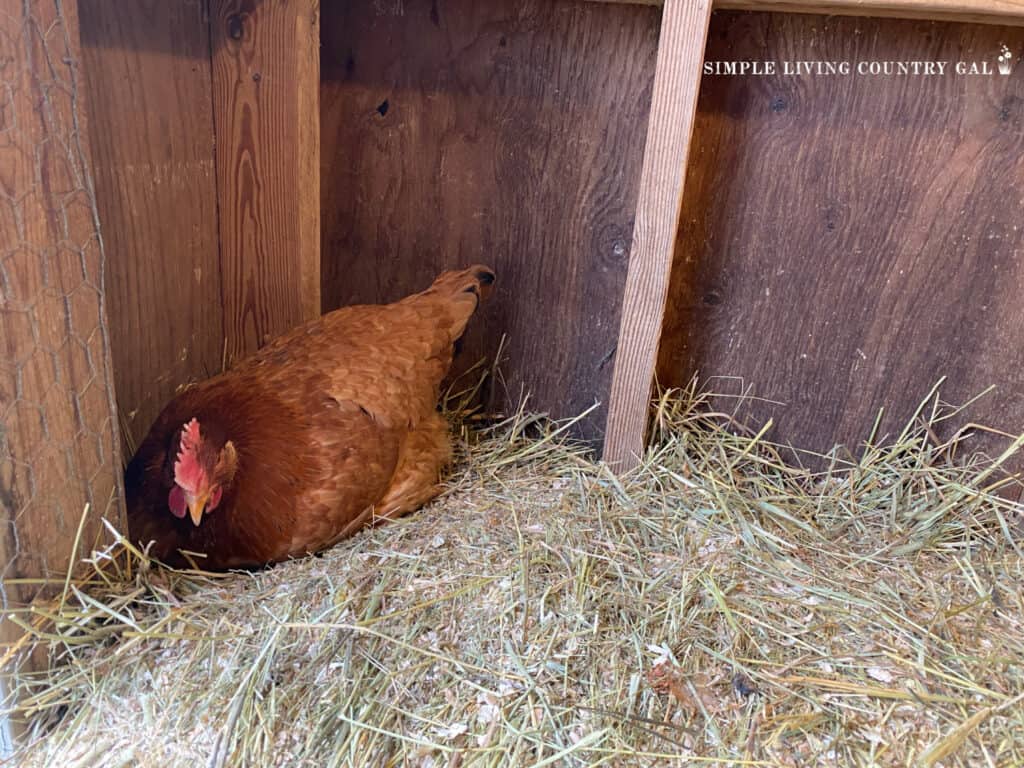
Possible issues:
- Bacterial infections such as salmonella or E coli.
- Parasites or worms such as coccidia.
Care Suggestions:
- Remove your sick chicken and keep it separate until you can diagnose it or take them to the vet.
- Collect a fecal sample and send it in for testing, or take it to your vet to see if they have a worm load.
- Take your chicken’s temperature. A healthy hen’s temp ranges from 105°F and 107°F.
- Provide plenty of fresh food and water for your chicken to keep them nourished.
- Natural health supplements like probiotics or apple cider vinegar may be beneficial.
READ: Apple Cider Vinegar for Healthier Chickens
Symptoms of an Injured Chicken – External
When it comes to injuries, chickens can suffer from cuts, bruises, and broken bones. They can also experience strains and sprains due to their active lifestyle.
What to Watch for:
- Limping or difficulty moving
- Swelling in the joints, legs, or feet.
- Bleeding wounds, or even feather loss.
Possible Issues:
- Injury from leaving the roost or their nesting box.
- Injury from hen-pecking in the flock.
- Injury from an outside rodent.
Care Suggestions:
- Inspect your chicken carefully and assess the extent of the injury.
- If it looks severe or your chicken seems in pain, seek advice from a vet immediately.
- Minor injuries can usually be treated at home with antiseptic cream and antibiotic ointment. More chicken first aid help.
- Clean any wounds with warm water and apply the cream.
- You may also need to restrict their movement by providing a comfortable, dark area for them to rest in.
- Provide plenty of fresh food and water.
- Natural health supplements like probiotics or apple cider vinegar may be beneficial.
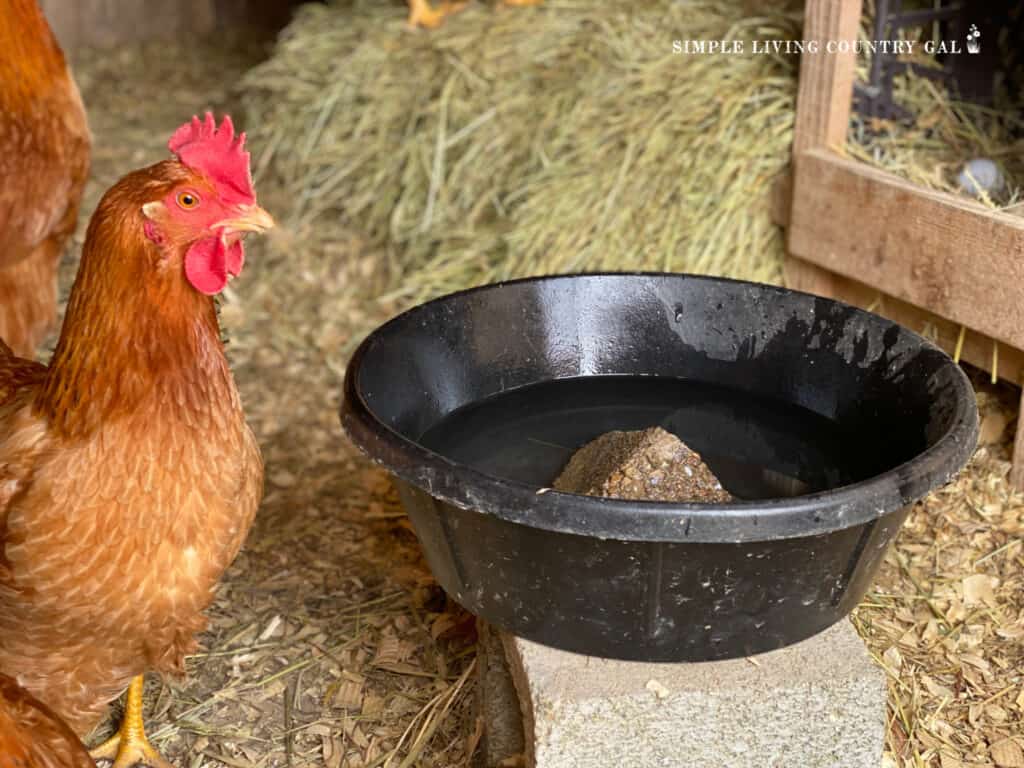
Henpecking Resources:
Symptoms of a Worm Infested Chicken
Chickens can become infested with worms that can quickly infect your entire flock. For that reason, it is important to keep an eye on any issues so you can catch them before they get out of hand.
Common Worms found in chicken:
- Roundworms
- Tapeworms
- Capillaria worms which can cause serious health issues if left untreated.
What to Watch for:
- Weight loss
- Pale comb and wattles
- Diarrhea
- General inactivity.
Care Suggestions:
- Take them to the vet for diagnosis and treatment. Your vet can prescribe a worming medication that can help get rid of the worms and restore your chickens to good health.
- Have a fecal sample tested online or at your vet’s office.
- Even if you have one chicken with worms, you will want to treat the entire flock.
- Provide plenty of fresh food and water.
- Natural health supplements like probiotics or apple cider vinegar may be beneficial.
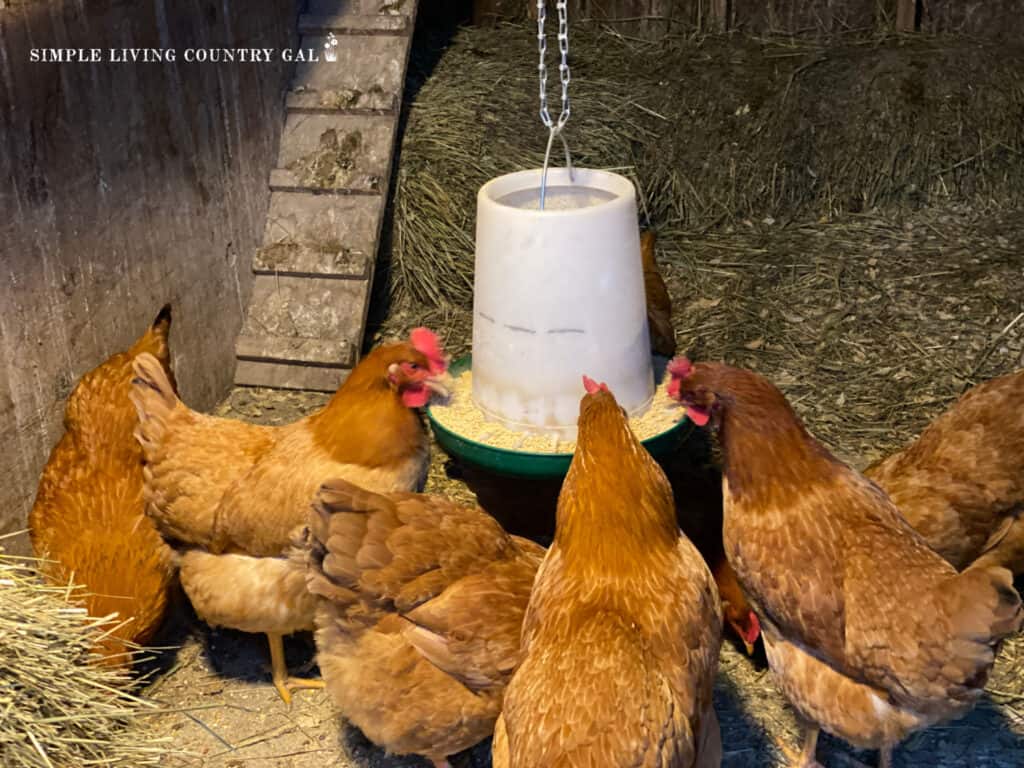
Symptoms of an Injured Chicken – internal
Chickens are surprisingly fragile creatures and can suffer from internal injuries. These types of injuries can be difficult to spot as they often don’t show any outward signs. If you suspect that your chicken has suffered an internal injury, take them to the vet immediately for diagnosis and treatment.
What to Watch for:
- Loss of appetite
- Reluctance to move
- Difficulty breathing
- Pale comb
Care Suggestions:
- Keep your chicken separated until they are fully healed. Many times the flock will attack a weak member.
- Provide plenty of fresh food and water.
- Natural health supplements like probiotics or apple cider vinegar may be beneficial.
READ: DIY Sick Crate for Chickens
Common (and Uncommon) Chicken Diseases
Each of these diseases has its own set of symptoms, so it is important to seek advice from a vet if you suspect your chicken may have one of these illnesses.
- Allergies – Symptoms may include: watery eyes, runny nose, wheezing, and difficulty breathing
- Dehydration – Symptoms may include: panting, lethargy, and spreading wings away from its body
- Digestive Issues – Symptoms may include: diarrhea, loss of appetite, and lethargy.
- Coccidiosis – Symptoms may include: eating very little or not at all, rapid weight, lethargy, ruffled feathers, severe diarrhea, and watery mucus feces.
- Marek’s disease – Symptoms may include: depression, paralysis, loss of appetite, weight loss, pale combs, dehydration, and sometimes diarrhea.
- Infectious bronchitis – Symptoms may include: runny nose and cough.
- Pneumonia – Symptoms may include: coughing, difficulty breathing, panting, and dull eyes.
- Avian influenza – Symptoms may include: lack of energy, loss of appetite, tripping, purple discoloration and/or swelling of various body parts, diarrhea, nasal discharge, coughing, sneezing, and reduced egg production
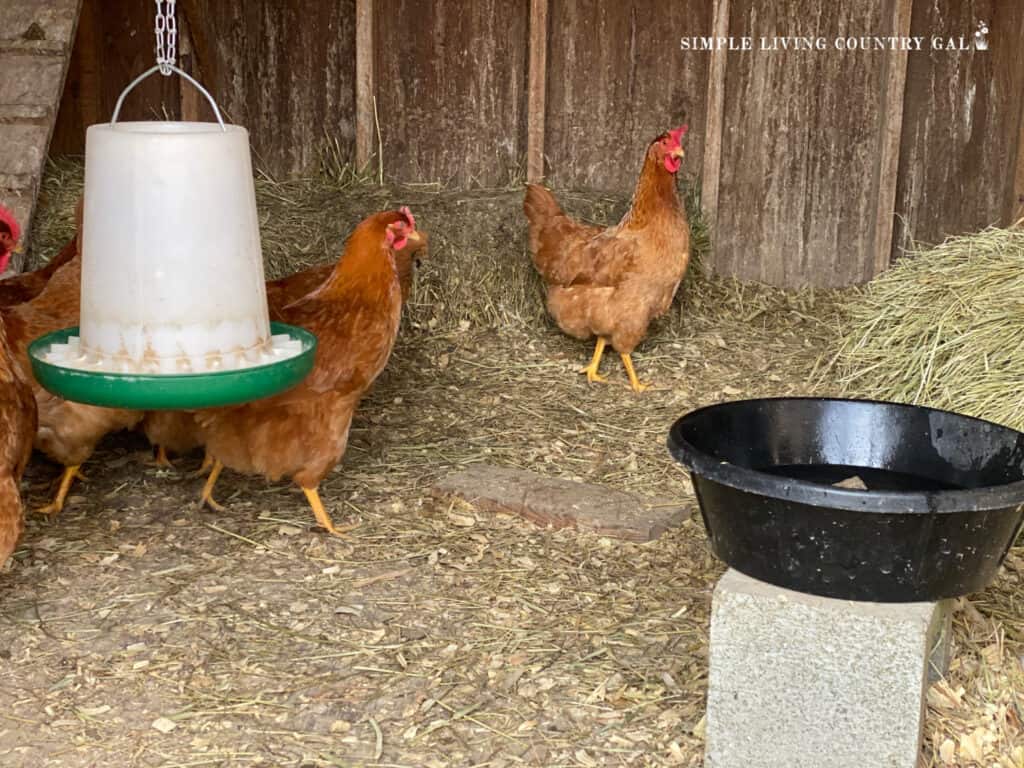
How to prevent chicken diseases
Let’s talk about what you can do to keep your flock healthy going forward.
#1. Keep a Clean Coop
The best way to keep your chickens healthy is to keep a clean coop and run. You can set up a routine of spot-cleaning your coop daily along with full coop cleanouts at the start of each new season.
Daily Coop Care:
- Give fresh water and rinse out the water bowl.
- Scrape manure boards.
Weekly Coop Care:
- Replace wet and soiled bedding.
- Clean out nesting boxes if soiled or wet.
Seasonal Coop Care:
- Empty the entire coop
- Sweep the floor, walls, and ceiling.
- If you are able, hose it out and let it dry.
- Wash all feeders and waterers.
- Wash the nesting boxes.
- Apply fresh bedding
More Coop Care Resources:
#2. Vaccinate
Vaccinations can also help protect your birds against certain diseases. Most chicks are given vaccinations when they are born, to ensure yours receive them contact the company or store and ask.
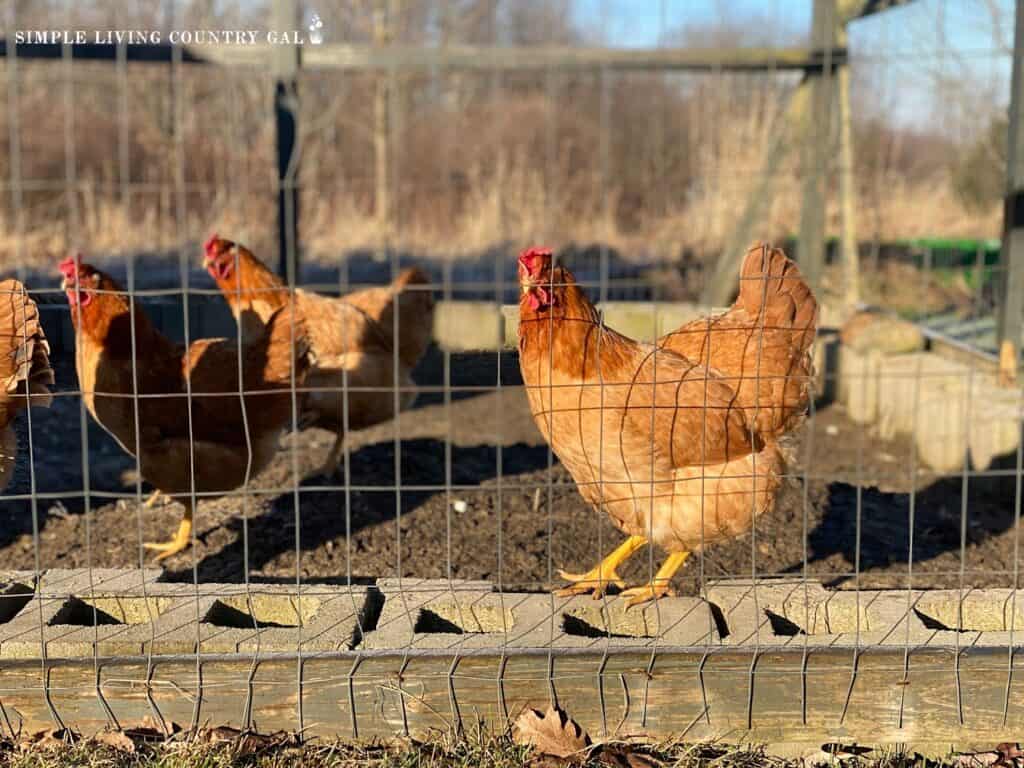
#3. Vet Relationship
Veterinary care is the best way to treat illnesses in chickens. As soon as you add chickens to your homestead, contact your vet to see if they care for poultry. If they do not, ask if you are able to call for advice if needed. Sometimes they will help you over the phone with a sick or injured hen or rooster.
Treatment for illnesses in chickens will vary depending on the specific issue. Make sure to follow all instructions from your vet and provide plenty of rest, fresh food, and water to help get your chicken feeling better as soon as possible.
Having a sick chicken can be worrying, but with the right knowledge and care, you can help your feathered friend feel better.
Make sure to watch for any signs of illness or injury in your chickens, such as weight loss, lethargy, or pale combs and wattles. If you spot any of these signs, take your chicken to the vet for a diagnosis and treatment.
In some cases, home remedies can also help treat illnesses, so make sure to provide plenty of fresh food and water, as well as rest and access to fresh air. With the right care, you’ll have your chicken back to full health so they can return to the flock.
